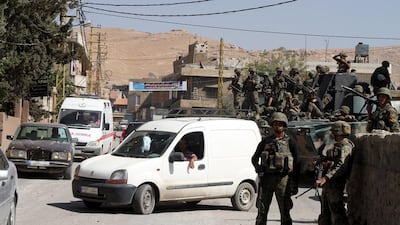BEIRUT // Islamic State insurgents who seized a Lebanese border town this month planned to turn Lebanon into another Iraq by unleashing sectarian war between Sunnis and Shiites that would have endangered the nation’s very existence, the army commander said.
General Jean Kahwaji said that radical Islamists on the march in Iraq and Syria still posed a “great threat” to Lebanon, which was torn apart by a 1975-90 civil war and has been badly buffeted by the Syrian conflict.
“The army hit them and continues to, smashing their plan,” said Gen Kahwaji, 37 of whose soldiers were either killed or captured in the battle for the border town of Arsal. “But this does not mean that the story is over,” he said.
“They might think of another plan and try another time to cause Sunni-Shiite strife,” said Gen Kahwaji, 60.
The August 2 attack marked the most serious spillover to date of Syria’s three-year-old civil war into Lebanon and the first time a foreign invader has taken Lebanese territory since Israel entered the south during its 2006 war with Hizbollah.
Battle-hardened in Syria, the insurgents were members of radical Sunni groups including the Islamic State, which has redrawn the borders of the Middle East by seizing territory in Syria and Iraq. The group’s advance has accelerated since it seized the Iraqi city of Mosul in June.
Dozens of the militants were killed in Arsal during a five-day battle with the Lebanese army, according to army estimates. The militants withdrew into the mountainous border zone last Thursday, taking with them 19 captive soldiers.
Gen Kahwaji, dressed in military fatigues, said the Islamists’ aim had been to turn the Sunni Muslim town of Arsal into a bridgehead from which to advance on surrounding Shiite villages, igniting a sectarian fire storm he said would have destroyed Lebanon.
“The strife in Iraq would have moved to Lebanon — 100 per cent,” said Kahwaji, a Maronite Christian.
He said he was basing his assessment on the confessions of an Islamist commander whose detention on August 2 was the immediate trigger for the battle. The commander, Emad Gomaa, had been “fine tuning” the plan at the time of his arrest, Gen Kahwaji said.
Mr Gomaa, 30, was a member of Al Nusra Front, Al Qaeda’s affiliate in the conflict, but had recently switched allegiance to the Islamic State. He had previously worked as a purveyor of dairy products, Gen Kahwaji said.
His confessions had led to the arrest of a number of militant cells in different parts of Lebanon, he added.
“Would there have remained a state? It is a battle for the survival of the Lebanese entity,” Gen Kahwaji said.
Tensions between Lebanese Shiites and Sunnis are already running high, exacerbated by the role played by the powerful Shiite group Hizbollah fighting alongside president Bashar Al Assad’s forces in Syria.
Lebanese Sunnis have broadly been supportive of the uprising against Mr Al Assad, a member of the Alawite sect, which is an offshoot of Shiite Islam. Lebanon is also now home to an estimated 1.6 million Syrian refugees, most of them Sunnis.
Though its arsenal is more powerful than the Lebanese army’s, Hizbollah stayed out of the Arsal battle, wary of wider sectarian strife in a country already hit by suicide bombings, gun battles and rocket attacks linked to the Syrian war.
The arrival of Islamic State fighters waving the group’s black flag on the northeastern border triggered panic in a country that is home to many religious groups at risk from a movement that has beheaded and crucified its opponents.
Gen Kahwaji said: “If the world and the people give up, then the black flag will arrive in Lebanon. But the people are with the army and they won’t let them arrive.”
The army has been crucial to holding the Lebanese state together since the civil war. It recruits from across the religious spectrum and is more widely trusted than other security agencies that have a more sectarian character.
Outside Gen Kahwaji’s office at the ministry of defence in the hills outside Beirut, a cartoon shows a soldier carrying a map of Lebanon on his back.
The Arsal crisis rallied all of Lebanon’s main leaders, including Sunni politician Saad Al Hariri, around the army. Gen Kahwaji described Mr Al Hariri’s backing as crucial. He “sensed the degree of danger to Lebanon”, he said.
Mr Al Hariri returned to Lebanon on Friday for the first time since 2011, ending his self-imposed exile following the downfall of his government to buttress the moderate Sunni camp against radicals who have gained ground during his absence.
He brought with him a $1 billion grant from his regional patron Saudi Arabia — aid designed to help the Lebanese security forces fight Sunni extremists. “He was obliged to return to fill the (Sunni leadership) vacuum,” Gen Kahwaji said.
The Saudi aid comes on top of a previous pledge of $3 billion in military aid from Riyadh. The Beirut government has asked France to accelerate the delivery of weapons due to be procured with that grant.
Gen Kahwaji said his priority was to secure warplanes — both fixed wing and helicopters — to support his land forces.
Many Lebanese believe Gen Kahwaji is now more likely than ever to fill the post of the presidency, vacant since Michel Suleiman’s term expired in May. The presidency is reserved for a Maronite according to Lebanon’s sectarian power-sharing system.
Mr Suleiman and his predecessor, Emile Lahoud, were both former army commanders. Gen Kahwaji declined to answer questions on Lebanon’s political outlook, and dismissed speculation that his chances of becoming head of state had now increased.
“What is happening is more important than the subject of the presidency,” he said. “If they had succeeded in what they were planning ... the very foundations of Lebanon would have changed.”
* Reuters

